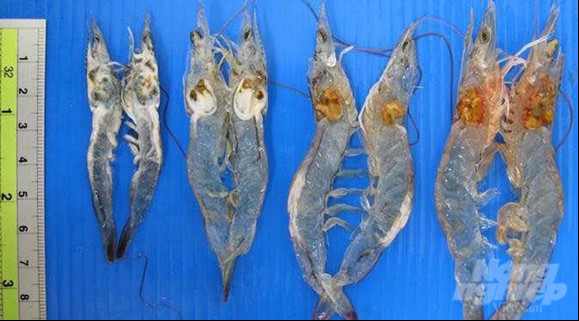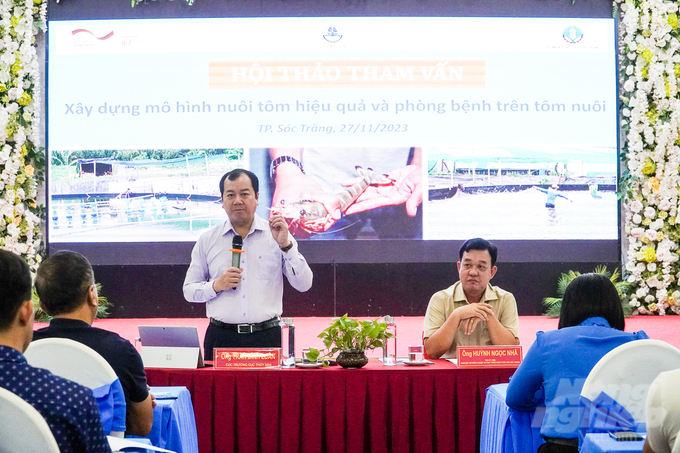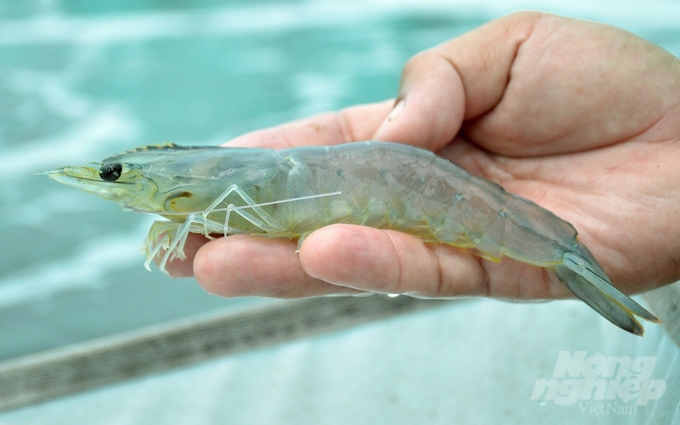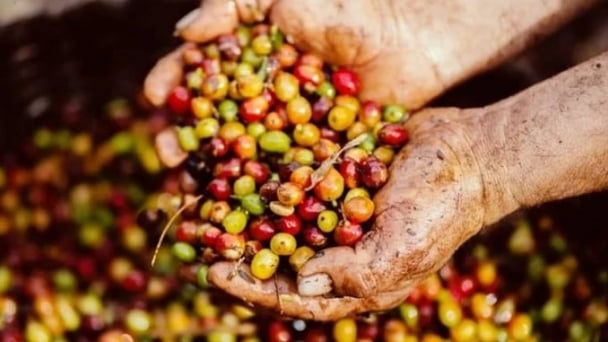June 18, 2025 | 01:09 GMT +7
June 18, 2025 | 01:09 GMT +7
Hotline: 0913.378.918
June 18, 2025 | 01:09 GMT +7
Hotline: 0913.378.918
Diseases in farmed shrimp are a major concern of many enterprises and shrimp farming households in the Mekong Delta in general and Soc Trang province in particular. Statistics from the Department of Animal Health show that up to this point of the year, over 20,000 ha of the shrimp farming area has suffered damage, affecting the production of 20 shrimp farming provinces, down 5% compared to the same period in 2022.
The commonly seen diseases are white spot disease (WSD) and acute hepatopancreatic necrosis disease (AHPND). In particular, enterocytozoon hepatopenaei disease (EHP) has also made its appearance, causing scattered damage in provinces and cities across the country. There is a high possibility that EHP disease will spread and create more losses in the near future.

Samples of farmed shrimp tested for EHP infection. Photo: Kim Anh.
According to statistics from the Sub-department of Livestock Production and Animal Health (Soc Trang Department of Agriculture and Rural Development), the damage rate on farmed shrimp has now been controlled at below 4.4%, down 0.9% compared to the previous year. The damaged areas are scattered in localities mainly because of environmental factors, white spot disease, AHPND, white feces syndrome and EHP.
Results of analysis of damaged seafood samples by the professional sector reveal that the rate of white spot disease, AHPND and EHP is relatively higher in comparison to the same period last year. Most of the farmed shrimp is damaged from June to August, peaking in July. Heavy rains cause a sudden decrease in salinity which leads to water stratification. Toxic gases increase rapidly due to the decomposition of algae, organic humus, and the local lack of oxygen, resulting in the farmed shrimp going into shock.
Recently on November 27 in Soc Trang province, the Department of Fisheries (Ministry of Agriculture and Rural Development) organized a consultation workshop on building an effective shrimp farming model and preventing diseases in farmed shrimp. Huynh Ngoc Nha, Director of Soc Trang Sub-department of Agriculture and Rural Development, said at the workshop that the 2023 shrimp crop faces many difficulties, and the progress of shrimp seed stocking is 9.1% slower than last year’s crop.
“The objective reason is that the rivers are late to reach a favorable salinity level, plus the price of raw shrimp is continuously decreasing. Meanwhile, the cost of input materials such as feed, seeds, environmental treatment products has increased, greatly affecting the production efficiency of many shrimp farms in the province,” said Director Huynh Ngoc Nha.

The consultation workshop on building an effective shrimp farming model and preventing diseases in farmed shrimp was recently organized by the Department of Fisheries (Ministry of Agriculture and Rural Development). Photo: Kim Anh.
“EHP disease spreads silently and violently. The EHP infection rate in hatcheries in Vietnam is extremely high at the moment,” said Hoang Thanh Vu, Sao Ta Foods Join Stock Company.
Regarding the current shrimp farming process, Sao Ta Foods JSC has basically solved the problem of EHP disease in farms. Even when the shrimp is infected with EHP from water sources, its ability to resist the disease is fairly high.
Therefore, if shrimp seeds after 20 days were detected to be infected with EHP, it is very likely that the problem lies in the hatchery. The method of checking and testing for EHP disease on shrimp is still not appropriate, the number of shrimp seeds sampled for testing is too small compared to the scale of the farm.
Sharing the same opinion, Vo Van Phuc, General Director of Vietnam Clean Seafood Corporation also believes that that EHP disease comes from hatcheries. “The seed quality management is ‘very bad’, diseased seeds are all over the market. Companies may be capable of controlling the disease situation, but it will be difficult for farmers”.

Common dangerous diseases in shrimp today include white spot disease, AHPND, and EHP. Photo: Kim Anh.
Along with choosing reputable seed suppliers, Vietnam Clean Seafood Corporation has researched the time to stock seeds at the end of the rainy season (from December to April of the following year). This company also provides a comprehensive solution for treating and preserving clean water sources, focusing on environmental hygiene and disease prevention while combining biosafe measures.
"The seed is of utmost importance. If you do the other steps well but the shrimp seed is infected, you will surely suffer because there is no way for the shrimp to reach the finish line. The loss would be massive. We hope that state agencies will have measures to maintain the disease-free seed source since the current control work is not strong enough," said General Director Phuc.
Translated by Samuel Pham
![Turning wind and rain into action: [7] Early disaster warnings help marine farmers minimize losses](https://t.ex-cdn.com/nongnghiepmoitruong.vn/608w/files/news/2025/06/17/z6704423696987_15fd32ffc26d590d204d520c9dac6786-nongnghiep-142942.jpg)
(VAN) In recent years, thanks to early disaster warnings and forecasting, marine farmers in Khanh Hoa province have been able to reduce risks and losses, thereby improving production efficiency.
![Turning wind and rain into action: [6] ‘Four on-the-spot’ disaster management software](https://t.ex-cdn.com/nongnghiepmoitruong.vn/608w/files/news/2025/06/17/e5a48259d6a262fc3bb3-nongnghiep-183800.jpg)
(VAN) By simply activating the scenario on the disaster management software, the relevant authorities immediately know how many households need to be evacuated, where to evacuate them to, and by what means of transportation…
![Turning wind and rain into action: [5] Hue applies modern technology in disaster forecasting](https://t.ex-cdn.com/nongnghiepmoitruong.vn/608w/files/news/2025/06/17/z6704423696987_15fd32ffc26d590d204d520c9dac6786-nongnghiep-093938.jpg)
(VAN) In Hue city, modern technology has recently been applied in meteorological and hydrological forecasting and warning, helping to reduce the damage caused by natural disasters.

(VAN) A cutting-edge farming technique being implemented on an experimental ranch in Arizona's Sonoran Desert has already saved a billion gallons of water over five years, according to Civil Eats.

(VAN) Poultry and pig production and the environment can be boosted through enhanced water technology, according to new research.

(VAN) Coffee prices on June 16, 2025 are unchanged. In Vietnam, local trading prices are holding steady, ranging around VND 112,000 – VND 112,500/kg.
![Turning wind and rain into action: [4] Bringing climate bulletins to remote and isolated areas](https://t.ex-cdn.com/nongnghiepmoitruong.vn/608w/files/linhnhp/2025/06/14/1152-z6704423696987_15fd32ffc26d590d204d520c9dac6786-nongnghiep-151141.jpg)
(VAN) The Vietnam Agriculture and Nature Newspaper interviewed Mr. Vu Thai Truong, Acting Head of Climate Change and Environment at UNDP Vietnam, to gain deeper insight into how climate bulletins are delivered to farmers.